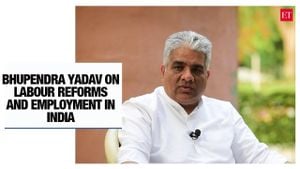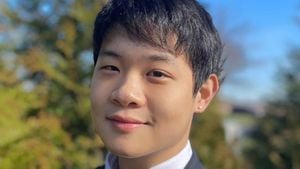The influencer industry, once seen as a golden path to fame and fortune, now reveals a more complex and often challenging reality. Many influencers are starting to speak out about the psychological toll of their careers, sharing experiences of anxiety, burnout, and the constant pressure to maintain a curated online presence. As social media platforms like Instagram, TikTok, and YouTube proliferate, the industry has grown and evolved, driven by an ever-hungry audience craving new content.
Take Michelle Phan, one of the earliest and most recognizable beauty influencers, who carved a niche for herself starting in 2007. With nearly 8.84 million subscribers on YouTube, Phan thrived in an environment that rewards constant content creation. But the need for endless engagement took a toll on her mental health. "It became harder and harder for me to pretend to be happy," she reflected, discussing her decision to take a break from uploading videos between 2017 and 2019. The pressures of showing a perfect life online can lead influencers to develop unhealthy relationships, not just with their audience, but also with themselves.
The financial rewards can be enticing; Phan reflects on the big money that comes with influencer marketing. With varying revenue streams, including ad shares from platforms like YouTube and sponsored content collaborations, influencers can earn significant income—sometimes upwards of $10,000 per post for those with a million or more followers on Instagram. Yet, the financial upside does not compensate for the relentless cycle of content creation and engagement, which can exacerbate mental health struggles.
This concept resonates with emerging creators facing similar pressures in today’s social media landscape. Take the McFarland brothers, Colin and Dylan, who built a following on TikTok with comedic skits and family dynamics. They represent a newer generation of influencers who often emphasize their authenticity. Colin stated, "Influencers are a new wave of people you can trust on the internet," showcasing how personal connection can translate into successful partnerships with brands like Colgate and Gillette. Yet even they highlight that the constant demand for fresh content can feel overwhelming as they navigate their growing audience.
The addition of artificial intelligence (AI) into the influencer marketing equation further complicates matters. As Dylan Duke discusses in Forbes, AI tools are increasingly utilized for photo editing, allowing influencers to enhance their images easily and quickly. While these tools promise efficiency, they also raise ethical concerns. The misrepresentation of oneself through heavy editing can breed distrust with audiences, undermining the authenticity that brands seek when partnering with influencers. Duke states, "Misusing AI photo-editing tools can not only lead to misrepresentation but may also expose influencers to precarious situations and consequences," indicating that the line between enhancement and deception is becoming blurred.
This evolving influencer landscape is not without its legal implications. Stability is an issue, with influencers working under precarious contracts while navigating nebulous regulations in different countries. The introduction of laws in Norway and France requiring transparency in advertising practices illustrates a growing recognition of the need for accountability in the influencer space. France’s law even legally defines what constitutes a commercial influencer, setting a precedent the U.S. has yet to formalize.
As more influencers continue to strive for success, mental health ramifications remain a pressing issue. Victoria Paris, a 23-year-old influencer with nearly 2 million followers, recently relocated to Los Angeles County seeking solace after facing intense anxiety and harassment. "I just want privacy for the first time in years," she shared, highlighting the toll that fame can take on one’s mental state. The constant scrutiny and unhealthy attention can sever one's sense of self, leading creators to question their worth outside the metrics of likes and engagement.
Christian Vierling, another up-and-coming social media star, also echoed similar sentiments. The comedic content creator stated that his alcoholism was intertwined with his brand—an unhealthy blend that ultimately brought him to reevaluate his lifestyle. Reflecting on the environment that influencers often find themselves in, Vierling admitted, "It was fun making the videos with alcohol—until it wasn’t." This sentiment reinforces the unhealthy cycles that can come with being an influencer, living a life partly dictated by the need to entertain.
Grace Atwood, a veteran influencer, expressed the difficulty of taking breaks from posting due to the fear of decreased engagement. She experienced significant declines in metrics after stepping away for just a weekend, highlighting how fragile the influencer economy can be. "Instagram really messes with my mental health," Atwood divulged, emphasizing the connection between social media engagement levels and personal well-being.
While there’s inherent risk associated with such a rapidly growing industry, being an influencer still remains an attractive aspiration for many. Approximately 54% of millennials and Gen Z individuals indicated that they would consider pursuing a career as an influencer if given the chance, according to research from Morning Consult. The initial allure of financial freedom plays a significant role in this interest, where many demographic segments view influencing as a means of achieving independence and self-expression.
In contrast, the overarching question remains: how sustainable is this dream? A few influencers have already taken steps to pivot away from the grueling demands of constant content creation, revealing a deeper understanding of their limits and mental health needs. Some are focusing on developing their own brands or stepping back to recharge, attempting to reclaim aspects of their lives lost in the whirlwind of transactions and connections.
This transition of influencers readdressing their paths signals a critical conversation in the industry about balance, mental health, and authenticity—a vital reassessment of the influencer role. The fascination with social media and influencing isn't solely about public visibility; it's also about understanding how one navigates these turbulent waters while maintaining their identity and mental wellness.
As the industry continues to evolve, there lies an opportunity for influencers to advocate for better mental health frameworks, drawing attention to burnout and emotional labor involved in their work. Sharing their stories, like that of Phan, Paris, and Vierling, highlights the pressures of their profession while also humanizing the often glamorized depiction of a lifestyle that's either perceived to be effortless or mistakenly perceived as entirely beneficial.
While the landscape remains complex and precarious, influencers across generations are grappling with their roles, the implications of their influence, and the realities of mental health in an industry driven by clicks, likes, and retweets. As we traverse through this digital age, it remains imperative to foster environments that prioritize the well-being of content creators, ensuring that they navigate their journeys without sacrificing their mental health or the authenticity that attracted their audiences to them in the first place.



